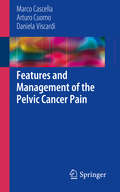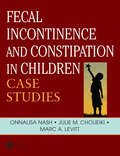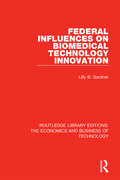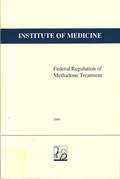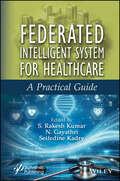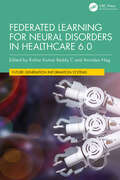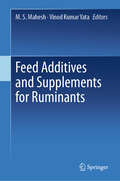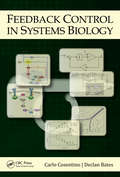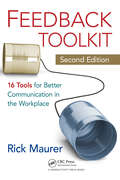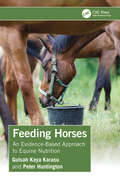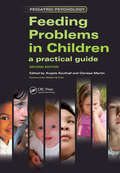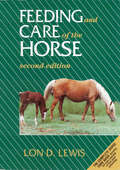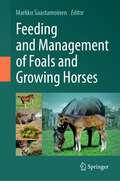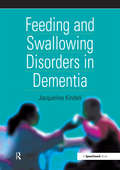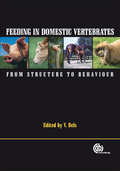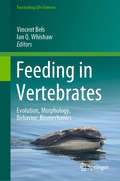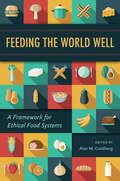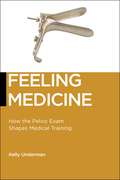- Table View
- List View
Features and Management of the Pelvic Cancer Pain
by Marco Cascella Arturo Cuomo Daniela ViscardiThis book focuses on the features of pelvic pain in the different cancer diseases, the pain assessment tools, as well as the pharmacological and non-pharmacological approaches. Pelvic cancer pain is a common and debilitating symptom, and pain control is a one among the main therapeutic goals throughout the duration of the disease. Because pelvic cancer pain due to primitive cancer, recurrence or metastasis is a complex clinical pathology, no single technique is often guaranteed to produce a complete pain relief. Thus, there are many treatment options, but in most cases a correct approach to pain control should be provided by a multidisciplinary team under the responsibility of a pain specialist coordinating several professionals. This book will aid several figures of practitioners, like anesthesiologists, oncologists or surgeons, in making the correct decisions in individual patients affected by cancer pain due to pelvic diseases.
Fecal Incontinence and Constipation in Children: Case Studies
by Marc A. Levitt Onnalisa Nash Julie M. ChoueikiThis book focuses on the management of children with fecal incontinence and constipation. Despite accurate anatomic reconstruction, many children still suffer from a variety of functional bowel problems. These include not only children with congenital anatomic problems such as anorectal malformations and Hirschsprung disease, but also includes the huge population of children who suffer from constipation, with or without soiling, and a large spinal population (spina bifida) who have bowel problems.
Fed Up!
by Susan OkieOnce dismissed by the medical profession as a purely cosmetic problem, obesity now ranks second only to smoking as a wholly preventable cause of death. Indeed, it's implicated in 300,000 deaths each year and is a major contributor to heart disease, diabetes, high blood pressure, high cholesterol, and depression. Even conservative estimates show that 15% of all children are now considered to be overweight--worldwide there are 22 million kids under five years old that are defined as fat. Supersized portions, unhealthy diets, and too little physical activity certainly contribute to what's making kids 'fat.' But that's not the whole story. Researchers are at a loss to explain why obesity rates have risen so suddenly and so steeply in the closing decades of the 20th century. But head out to the beaches, playgrounds, and amusement parks, and it's obvious that overweight children are more numerous and conspicuous. We see it in our neighborhoods and we read it in the headlines. Our nation--indeed the world--is in crisis. But knowledge is power and it's time to arm ourselves in the battle to win the war on obesity. Fed Up! is just what the doctor ordered. Based in part on the Institute of Medicine's ground-breaking report on childhood obesity, this new book from family physician and journalist Susan Okie provides in-depth background on the issue; shares heartrending but instructive case studies that illustrate just how serious and widespread the problem is; and gives honest, authoritative, science-based advice that constitute our best weapons in this critical battle.
Federal Bodysnatchers and the New Guinea Virus: Tales of Parasites, People, and Politics
by Robert S. Desowitz"[Desowitz's] stories...rank among the best current examples of medical detective prose."--Booklist Twenty years ago the world slept, confident that biomedical science would protect it from devastating plagues. Our wake-up call sounded at the outbreak of the AIDS epidemic. Then came more unfamiliar pathogens in its wake, such as the West Nile virus. Meanwhile, the neglected diseases of the third world, including malaria and African sleeping sickness, festered--their victims salvageable only by unaffordable, patent-protected drugs. Robert S. Desowitz traces the histories of these diseases and the issues we must confront--the morality and legality of patent laws, the effect of global warming on epidemics, public support for the commercial biochemical industry, the growing dissociation of clinicians and public health professionals, and the terrifying shadow of bioterrorism.
Federal Influences on Biomedical Technology Innovation (Routledge Library Editions: The Economics and Business of Technology #14)
by Lilly B. GardnerPublished in 1994, this book examines a small segment of the medical technology innovation process to characterize the manner in which the federal government influences small business-based investigators to participate or withdraw from the medical technology innovation process. It provides an historical account of the federal government's involvement in biomedical technology research and development, and traces the social and economic significance of this involvement.
Federal Narcotics Laws and the War on Drugs: Money Down a Rat Hole
by Thomas C RoweWe&’re losing the "war on drugs"-but the fight isn&’t over yetFederal Narcotics Laws and the War on Drugs examines our current anti-drug programs and policies, explains why they have failed, and presents a plan to fix them. Author Thomas C. Rowe, who has been educating college students on recreational drug use for nearly 30 years, exposes the truth about anti-drug programs he believes were conceived in ignorance of the drugs themselves and motivated by racial/cultural bias. This powerful book advocates a shift in federal spending to move funds away from the failed elements of the "war on drugs" toward policies with a more realistic chance to succeed-the drug courts, education, and effective treatment. Common myths and misconceptions about drugs have produced anti-drug programs that don&’t work, won&’t work, and waste millions of dollars. Federal Narcotics Laws and the War on Drugs looks at how-and why-this has happened and what can be done to correct it. The book is divided into "How did we get into this mess?" which details the history of anti-narcotic legislation, how drug agencies evolved, and the role played by Harry Anslinger, Commissioner of the United States Bureau of Narcotics from 1930 to 1962; "What works and what doesn&’t work," which looks at the failure of interdiction efforts and the negative consequences that have resulted with a particular focus on the problems of prisons balanced against the drug court system; and a third section that serves as an overview of various recreational drugs, considers arguments for and against drug legalization, and offers suggestions for more effective methods than our current system allows.Federal Narcotics Laws and the War on Drugs also examines: the creation of the Federal Bureau of Narcotics current regulations and structures current federal sentencing guidelines current state of the courts and the prison system mandatory sentencing and what judges think interdiction for heroin, cocaine and crack cocaine, and marijuana early education efforts the DARE program drug use trends drug treatment models the debate over legalizationFederal Narcotics Laws and the War on Drugs also includes several appendices of federal budget figures, cocaine and heroin purity and price, and federal bureau of prisons statistics. This unique book is required reading for anyone concerned about the drug problem in the United States and what is-and isn&’t-being done to correct it.
Federal Regulation of Methadone Treatment
by Committee on Federal Regulation of Methadone TreatmentFor nearly three decades, methadone hydrochloride has been the primary means of treating opiate addiction. Today, about 115,000 people receive such treatment, and thousands more have benefited from it in the past. Even though methadone's effectiveness has been well established, its use remains controversial, a fact reflected by the extensive regulation of its manufacturing, labeling, distribution, and use. The Food and Drug Administration regulates the safety and effectiveness of methadone, as it does for all drugs, and the Drug Enforcement Administration regulates it as a controlled substance. However, methadone is also subjected to a unique additional tier of regulation that prescribes how and under what circumstances it may be used to treat opiate addiction. Federal Regulation of Methadone Treatment examines current Department of Health and Human Services standards for narcotic addiction treatment and the regulation of methadone treatment programs pursuant to those standards. The book includes an evaluation of the effect of federal regulations on the provision of methadone treatment services and an exploration of options for modifying the regulations to allow optimal clinical practice. The volume also includes an assessment of alternatives to the existing regulations.
Federalism and Decentralization in European Health and Social Care
by Joan Costa-Font Scott L. GreerThis book integrates two disciplines- economics and political science- to map the past, present and future of the territorial allocation of authority in the decentralized big countries of Western Europe. By comparing different states, attention is drawn to the interesting similarities and differences that exist in the health and social case policies of varying countries in Europe. The result is an analysis that highlights the ubiquity of territorial politics and the necessarily territorial nature of many health and social care policies. By clarifying assumptions that economists, political scientists and practitioners have often introduced into their analyses of decentralization and the allocation of authority in health, this book brings to the fore theoretical discussions from second generation fiscal federalism and new politics of the welfare state alongside both quantitative and qualitative empirical evidence of different European countries that differ widely in institutional design and historical inertias.
Federalism and Public Health in India: Dissonant Discourses
by Balveer Arora Mohan RaoThe interface of public health and federalism are increasingly gaining scholarly attention in the fields of comparative federalism and welfare state studies. This volume looks into various facets of public health and governance in India from a legal, institutional and policy perspective.The volume explores the regulatory architecture around healthcare in federal systems of governance; public finance and insurance; private sector in medical care and the tussle for power between the union and the states. A multidisciplinary volume with essays from scholars working in public health, economics, political science and legal studies, the book critically evaluates India’s public policy apparatus dealing with health crises, inequity and the lack of health infrastructure and resources among other challenges. It also looks at the impact of the Covid-19 pandemic on federalism and democratic structures as well as the role of institutions such as the NITI Aayog and other central agencies in policy formulation and implementation within the broader framework of intergovernmental relations in a federal system.The book will be of interest to students and researchers of public health, public policy, health administration, medical sociology, constitutional law and political science, as well as of federalism.
Federated Intelligent System for Healthcare: A Practical Guide
by Seifedine Kadry N. Gayathri S. Rakesh KumarThis practical guide gives valuable insights for integrating advanced technologies in healthcare, empowering researchers to effectively navigate and implement federated systems to enhance patient care. Federated Intelligent Systems for Healthcare: A Practical Guide explores the integration of federated learning and intelligent systems within the healthcare domain. This volume provides an in-depth understanding of how federated systems enhance healthcare practices, detailing their principles, technologies, challenges, and opportunities. Additionally, this book addresses secure and privacy-preserving sharing of medical data, applications of artificial intelligence and machine learning in healthcare, and ethical considerations surrounding the adoption of these advanced technologies. With a focus on practical implementation and real-world use cases, Federated Intelligent Systems for Healthcare: A Practical Guide equips healthcare professionals, researchers, and technology experts with the knowledge needed to navigate the complexities of federated intelligent systems in healthcare and harness their potential to transform patient care and medical advancements. Readers will find the book: Provides cutting-edge research from industry experts to unlock the future of healthcare with innovative insights that embrace federated intelligence and shape the future; Presents novel technologies and conceptual and visionary-based scenarios; Discusses real-world case studies and implementations that illustrate how federated intelligence is practically applied across various healthcare scenarios, from personalized diagnostics to population-level insights; Stands as a pioneer in the exploration of federated intelligent systems in healthcare. Audience Data scientists, IT, healthcare and business professionals working towards innovations in the healthcare sector. The book will be especially helpful to students and educators.
Federated Learning for Neural Disorders in Healthcare 6.0 (Future Generation Information Systems)
by Anindya Nag Reddy C, Kishor KumarThis reference text offers a relevant and thorough examination of the overlap between neuroscience and federated learning. It explores the complexities of utilizing federated learning algorithms for MRI data analysis, demonstrating how to improve the accuracy and efficiency of diagnostic procedures. The book covers topics such as the prediction and diagnosis of Alzheimer’s disease using neural networks and ensuring data privacy and security in federated learning for neural disorders.This book: Provides a thorough examination of the transformative impact of federated learning on the diagnosis, treatment, and understanding of brain disorders Focuses on combining federated learning with magnetic resonance imaging (MRI) data, which is a fundamental aspect of contemporary neuroimaging research Examines the use of federated learning as a promising approach for collaborative data analysis in healthcare, with a focus on maintaining privacy and security Explores the cutting-edge field of healthcare innovation by examining the interface of neuroscience and machine learning, with a specific focus on the breakthrough technique of federated learning Offers a comprehensive understanding of how federated learning may transform patient care, covering both theoretical ideas and practical examples It is primarily written for graduate students and academic researchers in electrical engineering, electronics, and communication engineering, computer science and engineering, and biomedical engineering.
Feeble-Minded In Our Midst: Institutions for the Mentally Retarded in the South, 1900-1940
by Steven NollThe problem of how to treat the mentally handicapped attracted much attention from American reformers in the first half of the twentieth century. In this book, Steven Noll traces the history and development of institutions for the 'feeble-minded' in the South between 1900 and 1940. He examines the influences of gender, race, and class in the institutionalization process and relates policies in the South to those in the North and Midwest, regions that had established similar institutions much earlier. At the center of the story is the debate between the humanitarians, who advocated institutionalization as a way of protecting and ministering to the mentally deficient, and public policy adherents, who were primarily interested in controlling and isolating perceived deviants. According to Noll, these conflicting ideologies meant that most southern institutions were founded without a clear mission or an understanding of their relationship to southern society at large. Noll creates a vivid portrait of life and work within institutions throughout the South and the impact of institutionalization on patients and their families. He also examines the composition of the population labeled feeble-minded and demonstrates a relationship between demographic variables and institutional placement, including their effect on the determination of a patient's degree of disability.
Feed Additives and Supplements for Ruminants
by Vinod Kumar Yata M. S. MaheshThis book comprehensively reviews various feed additives and supplements that are employed for ruminant production and health. It discusses important strategies of using additives and supplements through rumen fermentation, immunomodulation, nutrient utilization, and cellular metabolism that lead to enhanced milk production, body weight gain, feed efficiency, and reproduction. The book also presents the importance of nutritional supplements such as B-vitamins, advances in mineral nutrition, role of lesser-known trace elements, protected amino acids, slow-release nitrogen and rumen buffers on performance and health of ruminants. In addition, the book explores strategies for improving environmental stewardship of ruminant production by minimizing carbon footprint associated with greenhouse gas emissions, enhancing ruminant-derived food safety through mycotoxin binders, exogenous enzymes, probiotics, flavours, biochar, ionophores, seaweeds and natural phytogenic feed additives with an emphasis on plant secondary metabolites (tannins, saponins and essential oils, etc.). It also details information on silage additives, additives and supplements employed in successful calf rearing, transition cow management as well as to ameliorate the adversity of heat stress in ruminants. Overall, the book is valuable for veterinary and animal science researchers, animal producers, nutrition specialists, veterinarians, and livestock advisors.
Feedback Control in Systems Biology
by Carlo Cosentino Declan BatesLike engineering systems, biological systems must also operate effectively in the presence of internal and external uncertainty-such as genetic mutations or temperature changes, for example. It is not surprising, then, that evolution has resulted in the widespread use of feedback, and research in systems biology over the past decade has shown that
Feedback Toolkit: 16 Tools for Better Communication in the Workplace, Second Edition
by Nigel Hooper Rick MaurerThis book provides expert guidance on using feedback as a performance improvement tool. It includes many simple tools readers can use to improve feedback in their work unit. The book suggests that feedback works best when the giver and receiver realize that they are in a dance together.
Feeding Horses: An Evidence-Based Approach to Equine Nutrition
by Gulsah Kaya Karasu Peter HuntingtonThis concise handbook provides evidence-based, practical horse nutrition accessibleto all readers. Standing out from very dense, theoretical and practical horsenutrition books, it arms equine students, veterinary students and horse ownerswith practically applicable information, bringing theory and practice together.At the end of each chapter, veterinarian and equine nutrition experts Dr GulsahKaya Karasu and Dr Peter Huntington provide guidance on practical applications,calculations and the real-life use of information. For example, how is gastric ulcerformation triggered by traditional horse feeding? How can the risk of gastric ulcerformation be reduced with evidence-based feeding?Divided into four parts, the book covers the horse’s digestive system, types offeeds, formulating rations, and nutrition-related health disorders. Its scientificallyvalidated, practical information will be invaluable for horse owners, students andtrainers, equine nutritionists and practitioners within the equine industry.
Feeding Problems in Children: A Practical Guide, Second Edition (Radcliffe Ser.)
by Clarissa Martin Angela SouthallFeeding problems in children are relatively common, and often resolve themselves with little need for intervention. However, some categories of feeding problem are severe, persistent, and may be life-threatening without skilled involvement by professionals, including medical and surgical intervention. This revised and expanded Second Edition of Feeding Problems in Children deals with these severe and persistent problems, summarising the different kinds of work undertaken with children and their families in a number of countries. It first discusses the theoretical frameworks and perspectives, before moving on to explore clinical and applied research aspects of children's feeding. Finally, a comprehensive Clinical Practice Toolkit has been added to this edition, providing clinical models, checklists, model forms and reports. Featuring contributions from well-known international experts in the field, comprehensive and fully referenced, this book continues to be essential reading for all those practising or training in paediatrics in primary or secondary care, including paediatricians, GPs, gastroenterologists, psychologists, psychiatrists, therapists, paediatric nurses, health visitors and allied health professionals. 'Given the multi-cultural composition of today's communities, the decision by Drs Southall and Martin to include a chapter on cultural aspects to feeding was most insightful. This book, with its comprehensive coverage of the issues and a practical Toolkit with examples of materials from a multi-disciplinary practice, makes an essential contribution to the education of frontline clinicians dealing with feeding problems in young children.' - from the Foreword by William B Crist From reviews of the First Edition: 'A detailed guide, extensively referenced' FAMILY MEDICINE 'A useful addition to a hospital library or multi-disciplinary paediatric library' PHYSIOTHERAPY JOURNAL
Feeding and Care of the Horse
by Lon D. LewisThis is the concise, easy-to-use version of Dr. Lewis's Equine Clinical Nutrition, Feeding and Care. It includes a full-color section identifying toxic plants and provides practical information on the diversified effects of different nutrients, feeds and supplements on a horse's athletic performance, reproduction, growth, hooves, appetite, behavior and disease. The book can help prevent common, but expensive problems in horses of all ages.
Feeding and Management of Foals and Growing Horses
by Markku SaastamoinenThis volume offers the latest research-based findings to equip professionals involved in the breeding and raising of horses. Contributions were carefully selected and prepared by leading experts in their fields. The collection starts with a discussion of pregnant and lactating mares, followed by details on foal development, nutritional requirements, and feeding practices under different conditions. Special sections on young horses in training, parasite control as well as on health risks related to nutrition and exercise round off this unique and easy-to-read reference.Today’s horses perform variety of roles and there are many categories of horses based on their breed, size and use, making adequate nutrition challenging. This book considers the links between health, proper dietary treatment and management practices to increase our understanding of the needs of growing horses. In addition, it highlights various innovations in equine nutrition and management to ensure animal wellbeing.Veterinarians, animal nutritionist, and all stakeholders and people working in the horse industry will benefit from the presented knowledge. This book fills a literature gap to prevent health consequences and strengthen performance and physical development in equines.
Feeding and Swallowing Disorders in Dementia
by Jacqueline KindellThis informative manual draws on expert research to highlight the feeding and swallowing difficulties that can occur with dementia. It is also a practical guide that offers potential strategies to manage these problems. Professionals are encouraged to focus on the needs of the individual by providing practical questions that should be asked when making an assessment. This is achieved through a step-by-step process, which allows a worker to observe, document and manage feeding and swallowing difficulties. Forms, schedules and checklists that can be photocopied are provided to aid in implementation. This is a detailed, practical resource which offers support and direction for speech and language therapists, and others with an interest in swallowing problems, working with people with dementia. It includes case studies to illustrate theory in practice, as well as a wide ranging bibliography.
Feeding in Domestic Vertebrates: From Structure to Behaviour
by V. BelsAimed at advanced students and researchers, this volume reviews current knowledge about feeding in domestic vertebrates. Early chapters outline the feeding structures and mechanisms of mammals and birds. Subsequent chapters discuss feeding behavior in particular species, such as chickens, pigs, rabbits, horses, herbivores, ruminants, and even ostriches. Feeding issues relating to free-range poultry and pigs are also addressed. Editor Bels is affiliated with the Muséum National d'Histoire Naturelle in Paris. Distributed in the U. S. by Oxford U. Press. Annotation ©2007 Book News, Inc. , Portland, OR (booknews. com)
Feeding in Vertebrates: Evolution, Morphology, Behavior, Biomechanics (Fascinating Life Sciences)
by Ian Q. Whishaw Vincent BelsThis book provides students and researchers with reviews of biological questions related to the evolution of feeding by vertebrates in aquatic and terrestrial environments. Based on recent technical developments and novel conceptual approaches, the book covers functional questions on trophic behavior in nearly all vertebrate groups including jawless fishes. The book describes mechanisms and theories for understanding the relationships between feeding structure and feeding behavior. Finally, the book demonstrates the importance of adopting an integrative approach to the trophic system in order to understand evolutionary mechanisms across the biodiversity of vertebrates.
Feeding the World Well: A Framework for Ethical Food Systems
by Alan M. GoldbergLeading experts reveal ways that the future of food production for the world's burgeoning population can (and must) be both sustainable and ethical.In the United States, food is abundant and cheap but loaded with hidden costs to the environment, human health, animal welfare, and the people who work in our food systems. The country's current food production systems lack diversity in crops and animals and are intensified but not sustainable, inhumane in the treatment of animals, and inconsiderate of labor. In order to feed the world's rapidly growing population with high-quality, ethically produced food, new food production systems are urgently needed. These new systems must be genetically diverse and environmentally sustainable, and they need to follow internationally recognized animal welfare and labor practices.Feeding the World Well examines these costs of cheap food while presenting a unique framework for ethical food systems: the Core Ethical Commitments, which are designed to guide consumers in choosing foods that are aligned with their values while helping producers enhance the ethics of their practices and products. Edited by Alan M. Goldberg, the volume features contributions from leading ethicists and food systems experts. Addressing complex issues such as climate change, worker exploitation, obesity, antibiotic resistance, wasted food, and biotechnology, the book discusses the fundamental forces that have shaped, and will continue to shape, our food systems. It also describes some of the approaches that food companies and nonprofit organizations are using to address the ethical challenges facing these food systems. Finally, the book explains what the Core Ethical Commitments are (and what they are not), how they were developed, and how they might be used by food system actors.By bringing together an all-star group of contributors from academia and industry, Feeding the World Well sets a new course for food production and how it is evaluated. By including the voices of industry leaders alongside those of researchers and regulators, the book prepares the food production industry for a world in which "ethical" or "sustainable" production practices are not only trendy but necessary to ensure that we can feed the world's growing population. Conceived as a textbook for food studies courses, this volume will appeal to anyone who is strongly interested in food, including conscious consumers, food industry leaders, researchers, and policy makers.Contributors: Anne Barnhill, Martin W. Bloem, Jonathan Bloom, Nicole M. Civita, Claire Davis, Michiel van Dijk, Adele Douglass, Shauna Downs, Kevin Esvelt, Ruth Faden, Jessica Fanzo, Evan Fraser, Maisie Ganzler, Tara Garnett, Sara Glass, Alan M. Goldberg, Christopher Good, Meredith Kaufman, Gillian Kelleher, Frederick L. Kirschenmann, Herman B. W. M. Koëter, Jennifer Kuzma, Kees van Leeuwen, Robert Martin, Anne E. McBride, Suzanne McMillan, Tom Morley, Marion Nestle, Peter O'Driscoll, Lance B. Price, Marie Luise Rau, Bernard Rollin, Yashar Saghai, Susan A. Schneider, Ellen K. Silbergeld, Paul B. Thompson, Paul Willis, Sylvia Wulf
Feeling Good about the Way You Look
by Sabine WilhelmIn a society where a blemish or "bad hair" can ruin an otherwise perfect day and airbrushed abs dominate the magazine rack, many of us feel ashamed of our bodies. If dissatisfaction with your looks is a distressing preoccupation, this compassionate book offers a way to break free from the mirror. Harvard psychologist Sabine Wilhelm leads you through a step-by-step program that helps you fight the urge to spend hours "fixing" your skin and hair, working out, or shopping for flattering clothes. Reality-check exercises based on cognitive-behavioral therapy demonstrate how to identify unfounded beliefs about your appearance. Once you understand the negative thoughts and feelings that distort your self-image, you'll be able to shed lengthy grooming rituals and overcome the embarrassment that keeps you from enjoying life. With Dr. Wilhelm's expert guidance, you'll learn to replace self-doubt and insecurity with confidence and a positive outlook. Whether you've spent thousands on plastic surgery or avoid trips to the beach, dating, or socializing, you owe yourself this opportunity to make peace with your looks. If you or someone you care about is struggling with a body image problem, effective care is finally at hand.
Feeling Medicine: How the Pelvic Exam Shapes Medical Training (Biopolitics #21)
by Kelly UndermanHonorable Mention, Sociology of the Body and Embodiment Best Publication Award, given by the Body and Embodiment Section of the American Sociological AssociationThe emotional and social components of teaching medical students to be good doctorsThe pelvic exam is considered a fundamental procedure for medical students to learn; it is also often the one of the first times where medical students are required to touch a real human being in a professional manner. In Feeling Medicine, Kelly Underman gives us a look inside these gynecological teaching programs, showing how they embody the tension between scientific thought and human emotion in medical education. Drawing on interviews with medical students, faculty, and the people who use their own bodies to teach this exam, Underman offers the first in-depth examination of this essential, but seldom discussed, aspect of medical education. Through studying, teaching, and learning about the pelvic exam, she contrasts the technical and emotional dimensions of learning to be a physician. Ultimately, Feeling Medicine explores what it means to be a good doctor in the twenty-first century, particularly in an era of corporatized healthcare.
